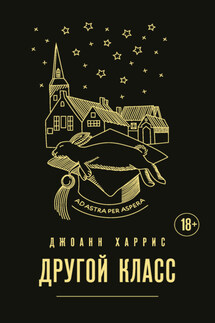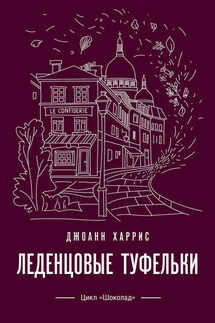Five Quarters of the Orange / Пять четвертинок апельсина - страница 62
At twelve thirty I heard the sound of motorcycles from the kitchen. A terrible sound, like pneumatic drills in unison, and I dropped the skillet with which I was turning a row of bolets farcis to run out into the road. The sound was unbearable. I clapped my hands over my ears and even then felt sharp pain lancing my eardrums, made sensitive from so many years of diving in the old Loire. Five motorcycles, which I had last seen propped against the sides of the Snack-Wagon, were now parked on the road just opposite, and their owners-three with girls perched delicately behind them-were revving up to leave, each trying to outdo the rest in volume and attitude. I shouted at them, but could hear nothing but the tortured screech of the machines. Some of the young customers at the Snack-Wagon laughed and clapped. I waved my arms furiously, unable to make myself heard against the din, and the riders saluted me mockingly, one rising onto his back wheels like a prancing horse in a redoubled gale of sound.
The whole performance lasted five minutes, by which time my bolets were burnt and my ears ringing painfully, and my temper risen to the melting point. There was no time to complain again to the owner of the Snack-Wagon, though I promised myself that I would as soon as my customers left. By then, however, the wagon had closed, and though I thumped furiously against the shutters, no one answered.
The next day the music was playing again.
I ignored it for as long as I could, then stamped off to complain. There were even more people than before, and a number of them, recognizing me, made insolent comments as I pushed my way through the little crowd. Too angry to be polite today, I glared up at the Snack-Wagon’s owner and spat:
“I thought we had an agreement!”
He gave me a smile as wide and as gleaming as a barn door. Inquiringly:
“Madame?”
But I was in no mood to be cajoled.
“Don’t go trying to pretend you don’t know what I’m talking about. I want the music off, right now!”
Polite as always, and now looking slightly hurt at my ferocious attack, he switched the music off.
“But of course, madame. I didn’t mean to offend you. If we’re to be such close neighbors we should try to accommodate each other.”
For a few seconds I was too angry even to hear the warning bell.
“What do you mean, ”close neighbors‘?“ I managed at last. ”How long do you imagine you’re going to be staying here?“
He shrugged. “Who knows?” His voice was silky. “You know the catering business, madame. Such an unpredictable thing. Crowds one day-the next, half empty. Who knows what may happen?”
The warning bells had grown to a jangle now, and I was beginning to feel cold.
“Your trailer’s on a public road,” I said dryly. “I imagine the police will move you on as soon as they spot you.”
He shook his head.
“I’ve got permission to be here, on the verge,” he told me gently. “All my papers bear scrutiny.” Then he looked at me with that insolent politeness of his. “Do yours, madame, I wonder?”
I kept my face stony, while my heart flipped over like a dying fish. He knew something. The thought spun dizzily in my head. Oh God. He knew something. I ignored his question.
“Another thing.” I was pleased with my voice, with its low, sharp quality. The voice of a woman who is not afraid. Beneath my ribs my heart beat faster. “Yesterday there was a commotion with motorcycles. If you allow your friends to disturb my customers again, then I shall report you for creating a public nuisance. I’m sure the police-”











